Persuasive argumentation is part of the human experience, and it is just as much a part of science as it is part of other human institutions. Scientists try to convince other scientists of their hypotheses. Scientists and science journalists also try to persuade members of the general public of various scientific claims. Scientists and science journalists are not the only individuals who make persuasive arguments about science, however. Those without any scientific credentials can, and do, argue for and against certain scientific claims. Others who have scientific credentials, but operate outside of the mainstream scientific community, generate persuasive arguments for and against certain scientific claims. For example, molecular biologist Peter Duesberg has scientific credentials, but he has argued for years that HIV does not cause AIDS. Michael Behe also has scientific credentials, but he has argued for a claim very much outside the scientific mainstream: intelligent design creationism (ID).
Several years ago, I became curious as to whether those in the scientific mainstream argued for their position in the same way that those outside the scientific mainstream argued their case. For instance, are the types of arguments used by mainstream scientists similar to the types of arguments employed by creationists? A little digging revealed that there was already some information on this topic. Weaver1 found that the two sides of the Scopes trial argued their case in different ways. Stempien and Coleman2 analyzed the arguments used in five different oral debates about the issue of origins. They concluded that creationists were successful in these debates because their arguments differed in form (but not content) from the arguments used by proponents of evolution. Rebecca Church and I3 described the ways that proponents of creationism and evolution differed in the manner in which they framed their arguments in terms of proof and certainty. They noted that creationists had a penchant for claiming that proponents of evolution had referred to evidence for evolution as “proof” of evolution. Creationists would then point out that the so-called proof was not 100% certain and, therefore, it wasn’t actually proof at all. Creationists concluded that scientists are either liars, or they are floundering because they can’t produce any proof to support their position.
Some of these studies looked at court transcripts or oral debates that were decades old (e.g., the Weaver study as well as the Stempien and Colemen study). The Barnes and Church study analyzed texts found in fairly contemporary websites. However, that study didn’t look at the specific kinds of persuasive arguments generated by the various sides of the origins controversy. Because there were certain unanswered questions regarding the nature of persuasive arguments about origins, Church, Samuel Draznin-Nagy, and I decided to analyze the contemporary websites that persuasively argued for either creationism, ID, or evolution.4 Our main goal was to identify all the persuasive arguments, and then describe them in terms of type and topic. It was our hope that this approach would shed some light on the specific manner in which creationists and proponents of evolution argue for their positions.
The Study
My colleagues and I used Google search to select the most commonly visited websites related to “scientific” creationism, ID, and evolution. We did not use sermons, PowerPoint presentations, audio, or video files. All of the websites we chose were advocacy sites that presented lists of arguments arguing for one of three positions: creationism, ID, or evolution. We ultimately selected 72 websites (including 34, 15, and 23 websites promoting creationism, ID, and evolution, respectively). We consider ID a type of creationism rather than an alternative to creationism.5 However, ID was created as a strategy to use changes in terminology to overcome legal hurdles that have kept creationism out of the public schools.6 For this reason, it seemed likely that ID and non-ID forms of creationism might use different arguments and rhetorical strategies. Our choice in keeping these two categories distinct allowed us to determine whether proponents of ID use different kinds of persuasive arguments than individuals from other creationist traditions.
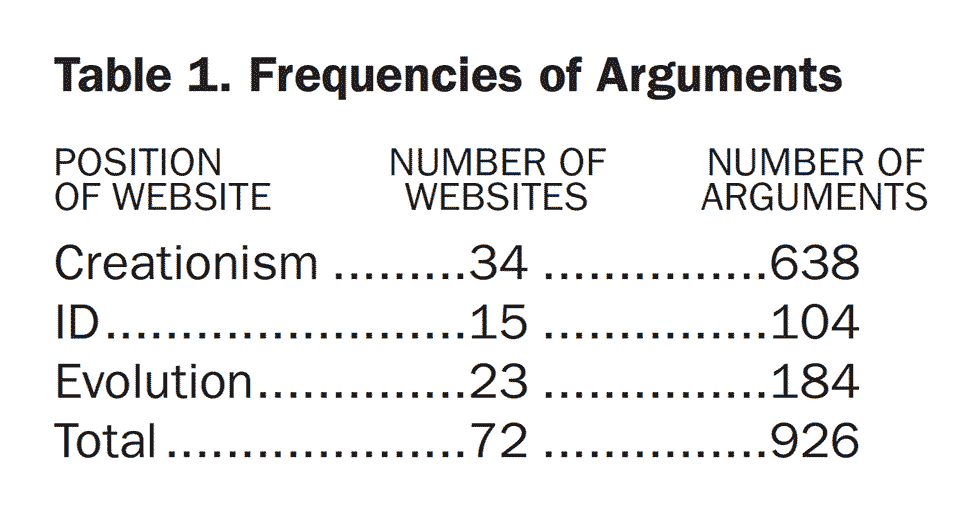
Once we selected the websites we would analyze, we had to identify the persuasive arguments in those websites (see Table 1). In some cases, our efforts to locate and identify arguments were made easy because some websites listed arguments by bullet points or numbers, while others used paragraphs or outlines to separate unique arguments. Once the arguments were located, our next job was to choose a systematic method for dissecting and labeling the arguments. Toulmin7 created a useful and widely used system in which an argument may be divided into its component parts, which include data and claim. Data includes the evidence or reasons given in support of a claim, while a claim is the conclusion that is supported by the data. For instance, consider the argument “Because dinosaur and human footprints were found together at the Paluxy River we know that humans and dinosaurs lived together at the same time.” The data would be the footprints and the claim would be “humans and dinosaurs lived together at the same time.” This example illustrates that the data may include incorrect information or faulty reasoning. In labeling part of an argument as “data” we do not imply that the data is either correct or trustworthy— merely that it has been used as support for a claim.
Pro-evolution websites overwhelmingly use arguments based on positive empirical evidence. In contrast, appeals to reason, authority, and empirical absence were the most common argument types for both creationist and ID websites.
Once we had identified the data and the claim of each of the arguments, it was our task to describe them. The data component of each argument provided us with the argument type while the claim of each argument provided us with the argument topic. As can be seen in Tables 2 and 3, we identified8 unique argument types and 8 unique argument topics.
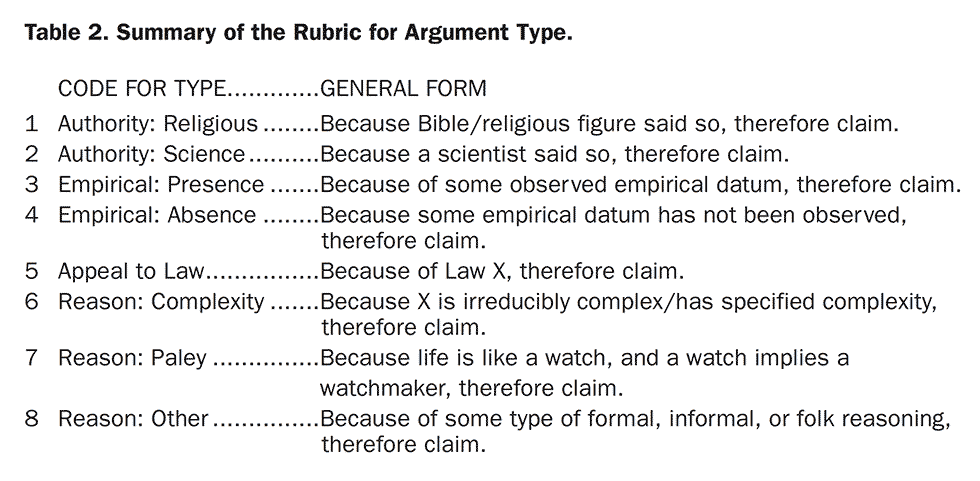
The names and the general forms of the argument types are presented in Table 2. Some of the argument types require some additional explanation.8 Examples of argument type 5 nearly always referred to the first and second laws of thermodynamics. Appeals of Empirical: Absence included such arguments as “Because no missing links have been found, evolution didn’t happen.” The focus of these arguments was not on empirical evidence that had been discovered, but on missing or absent empirical evidence. Appeals to reason rarely (if ever) relied on deductive syllogisms. Instead, the appeals to reason found in our selection of websites commonly employed informal or folk reasoning examples. We felt that it would be worthwhile to separate the category of reasoning into subcategories. The Reason: Complexity argument type referred to arguments based on data that life is irreducibly complex or has some level of specified complexity. The Reason: Paley argument refers to William Paley’s teleological argument (AKA the watchmaker analogy). The Reason: Complexity argument is similar to the Reason: Paley argument, but we only identified data as Reason: Complexity if the data explicitly referred to concepts such as irreducible or specified complexity. The Reason: Other category captured all the examples of appeal to reason that were not related to either complexity or Paley’s argument.
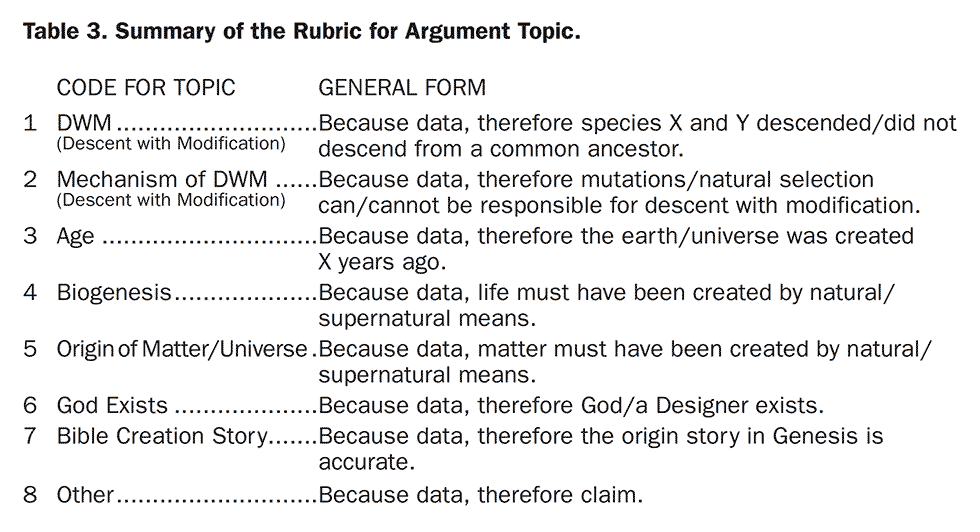
The names and the general forms of the argument topics are listed in Table 3. Some of these argument topics require a few words of explanation. Arguments that an Intelligent Designer exists were coded as argument topic 6. The intelligent designer was explicitly identified as the Christian god in many, but not all, of the creationist and ID websites. However, given that a goal of the ID movement is to eliminate religion from their teaching materials in order to open the door for the introduction of creationism in the public schools, it is likely that the term Intelligent Designer is a synonym for God in all creationist writings.9 Topic 7 (Bible creation story) included such things as the Genesis creation account, the story of Adam and Eve, Noah’s flood, and God’s behavior as described by the Bible.
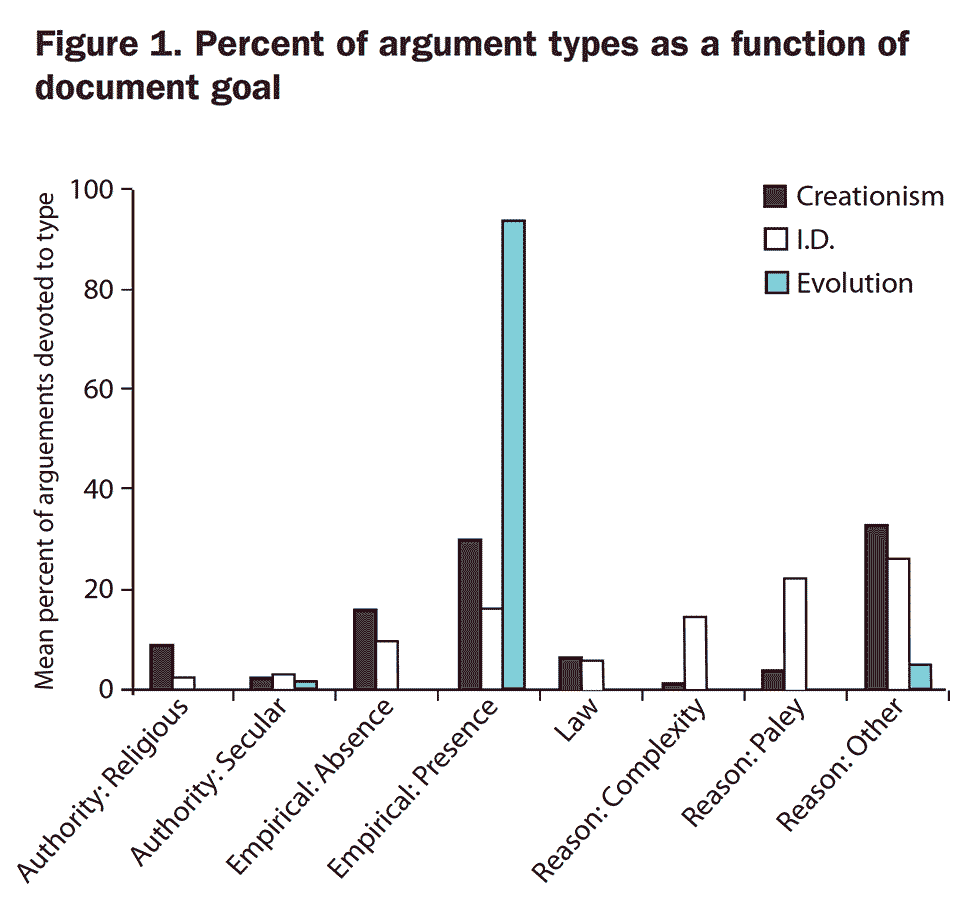
Samuel Draznin-Nagy and I independently coded both the type and topic of each of the arguments based on the rubrics for the categories listed in Tables 2 and 3. The summary of the results for the types of arguments can be found in Figure 1.10 When looking at the type data, the first thing that is evident is that pro-evolution websites overwhelmingly use arguments based on positive empirical evidence. In contrast, appeal to reason was the most common argument type for both creationist and ID websites. Websites that identified themselves as promoting ID did show a different pattern of argument types than other creationist websites. Specifically, the ID websites focus more narrowly on appeals to reason, whereas creationist websites frequently employed appeals to authority (e.g., the Bible says so) as well as appeals to empirical absence (e.g., there are no missing links) and empirical presence (e.g., the supposed dinosaur and human footprints at the Paluxy River).
Creation “scientists” do not gather and publish empirical evidence in the same way that mainstream scientists do, nor do they generate or use persuasive arguments in the same way that scientists do.
The summary of the results for the topics of arguments can be found in Figure 2. When looking at the summary of the topics, it evident that the websites promoting evolution are very narrowly focused on the topic of descent with modification (DWM). In fact, 171 out of the 184 arguments found in websites promoting evolution deal with this topic. While descent with modification is the most common topic in creationist websites, it accounts for less than 40 percent of the creationist arguments. The second most popular topic in websites promoting creationism involves the details of the Biblical creation story. ID websites stand in stark contrast to both evolution and creationist websites, in that the overwhelmingly most common topic in ID websites is the existence of God.
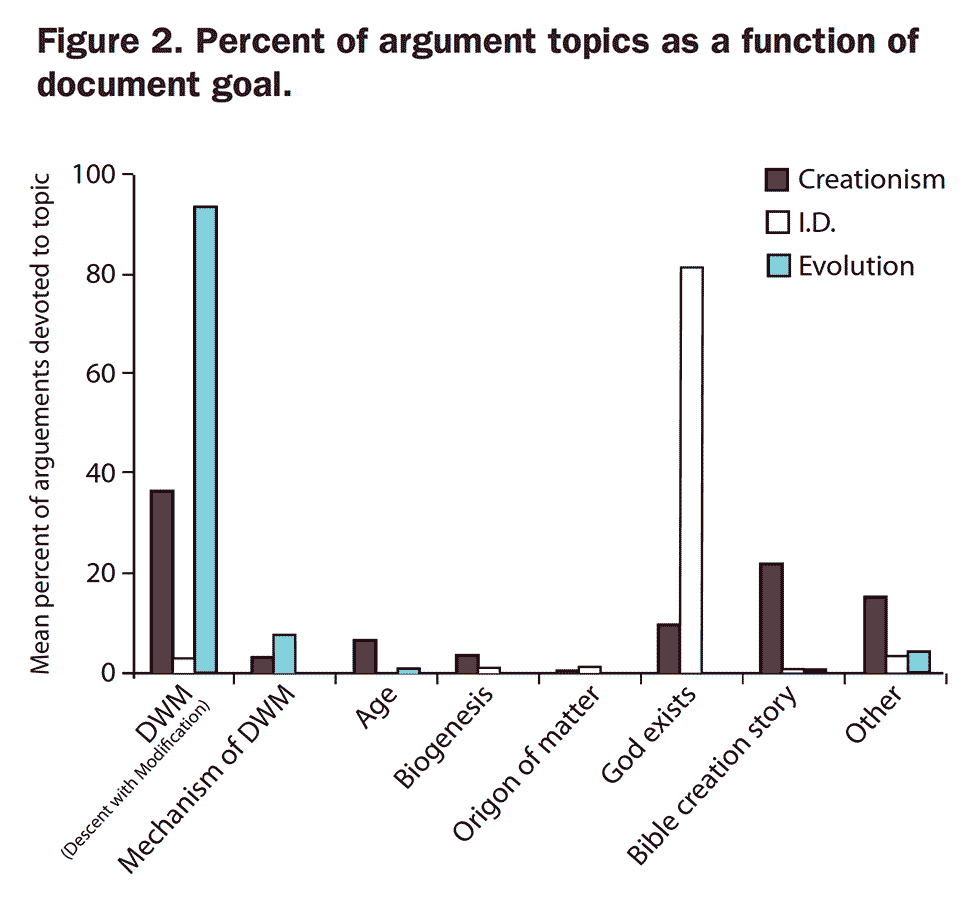
Discussion
There are several lessons to be learned from this analysis. It is well known that creation “scientists” do not gather and publish empirical evidence in the same way that mainstream scientists do. Now we see that they don’t generate or use persuasive arguments in the same way that scientists do. Those arguing for creationism differ from those arguing for a scientific position in terms of both the types and topics of their arguments. In terms of types of arguments, scientists overwhelmingly rely on appeals to positive empirical evidence. In contrast, ID creationists tend to rely on appeals to reason, while other creationists rely on a wide range of appeals to support their claims.
In terms of the topics of the arguments, scientists narrowly focus on descent with modification. However, creationist websites address a much wider range of topics. For instance, many creationist websites argue for things such as a very young earth/universe, a literal Garden of Eden, a creation that took a literal week to complete, the existence of God, and a worldwide flood. Many creationists aren’t narrowly attacking the theory of evolution so much as they are attacking natural history in general. One might wonder why the pro-evolution websites spend so little time responding to claims that the earth is less than 10,000 years old or that a worldwide flood once covered the planet. Why is there a disconnect between the topics found in pro-creationism and pro-evolution websites? Scientists might focus on descent with modification because creationists vocally reject the idea of descent with modification as an explanation for the origin of species, and creationists have repeatedly put scientists in a position in which they have had to defend the inclusion of evolution in public school curriculum. Alternately, it may be that scientists think that some of the creationist claims (e.g., young earth, worldwide flood, etc.) are so preposterous that they don’t deserve to be taken seriously. It is also possible that scientists are responding to creationist rhetoric in which “Darwinism” and Darwinists are constantly vilified. Self-proclaimed “scientific creationists” like to paint themselves as fans of science in general and enemies only of what they claim is bad science (i.e. evidence supporting Darwin’s theory).
Of the three groups, ID creationists have the least interest in the topic of descent with modification. In fact, they don’t seem to be very interested in the natural world at all: the most common focus of their arguments is on the question of the existence of the Christian god. The goal of the ID creationist movement was to make an end run around legal decisions such as McLean v. Arkansas and Edwards v. Aguillard that blocked creationism from public school classrooms.11 The current analysis reveals one way that the ID creationist movement was poorly designed to achieve its goals. Self-described ID creationists seem to be narrowly focused on the claim that God (who they refer to as the Intelligent Designer) exists. The most common argument found in the ID websites takes the general form, “because irreducible/ specified complexity, therefore God exists.” In contrast, other creationists make many claims about the natural world (e.g., the age of the universe, the origin of species, flood geology, etc.). ID creationists argue that the world supposedly contains evidence of a certain type of complexity, and from that starting point, they leave science and the natural world behind to claim that God exists. Rather than helping creationists get one step closer to inserting creationism into the public schoolrooms, the ID approach was actually a step backward. It has even less in common with true science than the “scientific creationism” approach used by the young earth creationist organizations (e.g., Answers in Genesis, Institute for Creation Research). The present analysis reveals that the ID creationism approach has been, and continues to be, primarily a program meant to prove the existence of God. It therefore bears more resemblance to natural theology and apologetics than it does to science. Seen in this light, it is surprising that ID creationists once believed that ID would somehow help them achieve their goals.12
I have shown that creationism and ID creationism differ from mainstream science in terms of the types of arguments they rely on and the topics they focus on. Creationists are not the only ones who have attacked mainstream science, however. Other groups have challenged, and continue to challenge, mainstream science positions (e.g., AIDS denialists and those opposed to vaccination, i.e., anti-vaxxers). If we analyzed the arguments of those groups and compared their arguments to related arguments generated by mainstream scientists, would we find a pattern of results that mirror those of the current study? That is, do creationists have a unique way of arguing for their position, or is their approach characteristic of other pseudoscientific movements? Members of my laboratory at Montana State University are currently analyzing arguments generated by four groups that have challenged the scientific mainstream: AIDS denialists, climate change denialists, the anti-GMO movement, and anti-vaxxers. We hope that this research program will reveal something about the way these groups are similar to or differ from creationist groups. ![]()
About the Author
Dr. Ralph M. Barnes earned his Ph.D. in experimental psychology from Ohio State University. He is now an associate teaching professor at Montana State University and engages in research on a number of topics including reasoning, decision making, and group processes. He is particularly interested in the ability of scientists to communicate with the general public.
References
- Weaver, R. M. 1997. “Dialectic and Rhetoric at Dayton, Tennessee.” In R. A. Harris (Ed.) Landmark essays on rhetoric of science (pp. 107–125). Mahwah, NJ: Hermagoras Press.
- Stempien, R. and S. Coleman. 1985. “Processes of Persuasion: the Case of Creation Science.” Review of Religious Research, 27(2), pp. 169–177.
- Barnes, R. M. 2014. “The Nature of Evidence and the Nature of Science: The Core Conflict Between Creationism and Evolution. Skeptic, 19(4), pp 49–53. See also Barnes, R. M. and R. A. Church. 2013. “Proponents of Creationism But Not Proponents of Evolution Frame the Origins Debate in Terms of Proof.” Science & Education, 22, pp. 577–603.
- I would also like to thank Daniel Drebing for his valuable contributions.
- The case that ID is a form of creationism has been argued by Scott (2009) and Pennock (2003). For another point of view, see Numbers (2011). The relevant references are: E. C. Scott. 2009. Evolution vs. Creationism: An Introduction (2nd Ed.). Berkeley, CA: University of California Press. R. T. Pennock. 2003. “Creationism and Intelligent Design.” Annual Review of Genomics and Human Genetics, 4, pp. 143–163. R. L. Numbers. 2011. Clarifying creationism: five common myths. History and Philosophy of the Life Sciences, 33, pp. 129–139.
- Scott, E. C. 2009. Evolution vs. Creationism: An Introduction (2nd Ed.). Berkeley, CA: University of California Press.
- Toulmin, S. E. 1958. The Uses of Argument. Cambridge: Cambridge University Press.
- For a more thorough description of the stimuli and methods used in this study, please see R. M. Barnes, R. A. Church, and S. Draznin-Nagy. 2017. “The Nature of the Arguments for Creationism, Intelligent Design, and Evolution.” Science & Education, 26, pp. 27–47.
- During the Kitzmiller v. Dover Area School District (2005) trial, it was revealed that the creationist textbook Of Pandas and People had been altered in such a way that “creation” had been replaced with “intelligent design” through a simple copyand-paste function. ID proponents replaced creation by God with design by an Intelligent Designer in the hopes of getting creationism into schools. What they accomplished, however, was revealing that their Intelligent Designer was simply God by another name.
- The type and topic results as presented here have been simplified. For a more detailed description of the results of this study, please see R. M. Barnes, R. A. Church, and S. Draznin-Nagy. 2017. “The Nature of the Arguments for Creationism, Intelligent Design, and Evolution.” Science & Education, 26, pp. 27–47.
- Scott, E. C. 2009. Evolution vs. Creationism: An Introduction (2nd Ed.). Berkeley, CA: University of California Press.
- Kitzmiller v. Dover Area School District
This article was published on February 20, 2019.







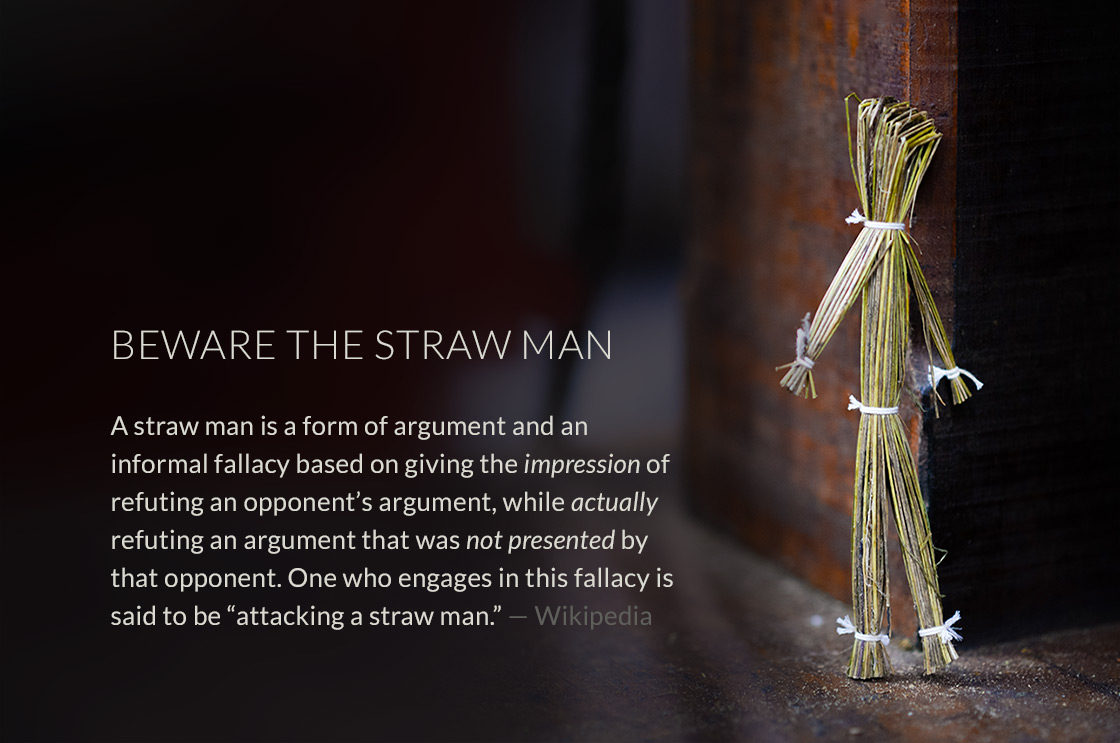











The upcoming study referred to in the final paragraph comparing the argument styles used by the four groups listed looks interesting. A similar type of study that would be even more interesting (but probably more complex) is one that compares the psychology of various groups that hold extreme (and in many cases demonstrably false beliefs) such as flat-earthers, religious fundamentalists and conspiracy theorists.
don’t understand the anti-GMO movement. it seems to me that ALL organisms are genetically modified, intentionally or not.
Jim, unless I’m reading your remarks wrong, you already answered your own question. It makes you an Intelligent Design believer.
If one believes (as I do), that the Big Bang had a Big Banger (God), who defined the rules of nature so that the Universe developed as it has, and that He takes an active interest in what happens, and that random events like mutations are part of his long term plan to bring things to the climax of the Universe as He perceives and desires, does that make me a creationist, an Intelligent Design believer, or someone with confidence in science who is aware of its limitations?
Some bad and incomplete thinking in the comments above.
If pro-evolution sites really do use science and empirical evidence than why is that not one of them can tell us how to test the claim that any bacterial flagellum evolved via blind and mindless processes?
Why is the science and empirical evidence totally lacking in peer-review?
Excuse me but Intelligent Design is NOT anti-evolution. Even Creation accepts variation, ie evolution, occurs.
The debate is all about the mechanisms- are they blind and mindless, like natural selection, or are designed, like genetic algorithms.
ID and Creation both claim that organisms were designed or Created with the ability to evolve and adapt.
Also ID does NOT say anything about God. ID doesn’t even require God.
Dave, what «law of causality»is it that postulates this «something (immaterial) in the beginning» – indeed, what is the «beginning» ? – from which you claim «the [presumably material] universe came» ? What evidence can you adduce for – or for that matter, against – the existence of such a law ? If, indeed, there is such a «law», which, according to your post, would seem to be an overriding principle for the organisation of our universe, can it be violated ? If so, what are the penalties, if any, for doing so ?…
Henri
I accept that evolution is a natural process. I would be open to any credible counter-evidence but have never seen anything even close– just religious silliness.
I accept the hypothesis that the HIV virus causes AIDS, but I would be open to any credible counter-evidence. Especially if it leads to better treatments or preventatives.
I accept that vaccines are often life-saving, but I oppose making them mandatory. (I oppose making anything mandatory because I oppose using government violence.)
I accept that the climate changes, and that human activities might affect the rate of change, but I don’t accept the politicization of climate science. Science + politics = politics.
https://blog.kentforliberty.com/2018/12/how-do-you-talk-to-someone-who-doesnt.html
Dunning-Kruger
I agree with the article, but I have comments on the “what comes next” at the end, “four groups that have challenged the scientific mainstream: AIDS denialists, climate change denialists, the anti-GMO movement, and anti-vaxxers.”
AIDS denialists: Is this AIDS not a result of HIV or AIDs was a conspiracy result or other. Like creationism, AIDS not a result of HIV just ignores the science, and I wasn’t aware this was still a viable theory, more than say Flat Earthers (which are still there, I know, but there are probably still some Odin worshipers somewhere.)
Climate change denialists: They could make better arguments 20 years ago, but denying these days seems like denying your barn is burning by turning your back. If you include the, “Sure, it’s there, but not caused by humans crowd”, you get some possible arguments (which I don’t believe but you can at least discuss the science on it.)
Anti-GMO: Well, I’m anti-GMO. I find releasing these products into the world to be irresponsible, leading to resistant bacteria and viruses. If it was confined to a lab, maybe, but out in the largest biological experiment area possible? With only a couple of decades of timeline? With too much interaction between government and the production companies? We still don’t know enough about potential interactions within animal or our own bodies over time to be doing this.
AntiVaxxer: Since the autism/vaccine link was discovered to be a fraud, there is no scientific basis for supporting it. You have to ignore the science to do so–which many do, but if someone can say, “I believe it’s so, because a Hollywood starlet is my authority on science,” then I’m not sure that any argument can reach this person. On other vaccines, I am a partial anti-vaxxer. I looked at the possible dangers (listed for each vaccine in their warnings), the prevention benefits (Get this one, it kills you. Get this other one, mostly you have a bad week.), and the risk of getting it. I homeschool my kids, lessening their potential exposure. So, my kids were vaxxed for the deadlies, and not for some of the others, since they are less exposed to sources, and also less likely to expose others to what they have. I don’t do the flu shot each year, as I find the potential protection (which may not be very good) vs. cost and pain (and a minimal risk) to be not worthwhile (and I work from home, reducing my risk). Haven’t gotten the flu the past decade–dosn’t mean I won’t this year, but c’est la vie (or c’est du morte).
Sorry Dave, but that’s not correct. Science is primarily concerned with empirical observation, you know, those pesky things called facts. Our observations can be extrapolated back to the moment of singularity but Science takes no position on what may or may not have preceeded it. Of course there are theories but nothing to date that can be proved so your proposition is based on a straw man. In any case, formal logic only applies the one universe we know and, quite possibly, only at the macro scale.
What a delightful irony that this entire piece, written, according to the tag, to combat straw man arguments, should be a fine example of straw man argumentation.
This book is on the subject and it has a unique perspective: When Evolution Stops.
Here’s another way the two arguments differ: One has something (immaterial) in the beginning, from which the universe came; the other ultimately has nothing in the beginning, with something (the universe or multiverse) coming from nothing (material or immaterial), in clear violation of the law of causality, one of the first principles of logic and the way empirical reality works that all children learn early on.